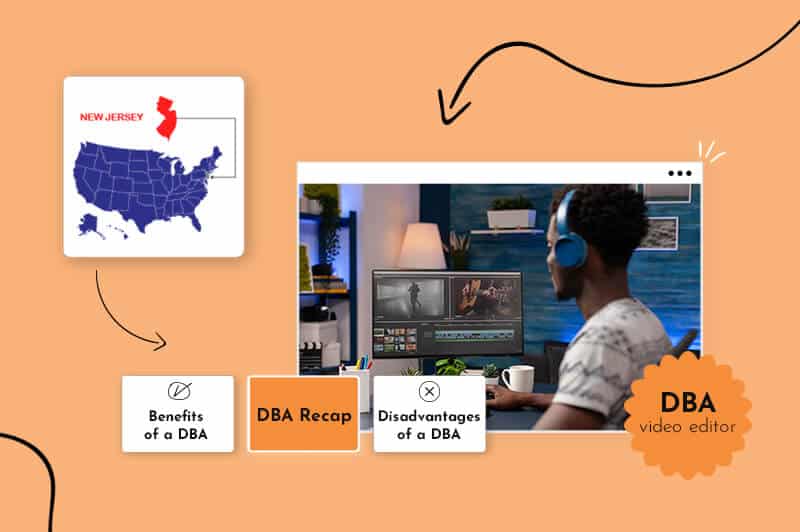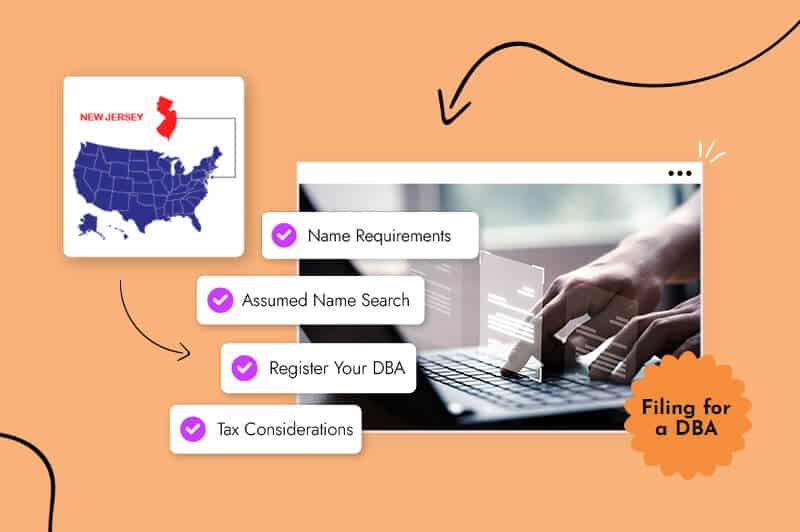
A “doing business as” name, often referred to as a DBA name, is often referred to as a fictitious name, trade name, or an assumed name. In most cases, businesses must register a name with the Department of State, Division of Revenue and Enterprise Services. However, sole proprietorships and general partnerships are not required to register their names since those entities use owners’ and partners’ names as legal business names.
DBA names are not just for sole proprietorships and general partnerships. Sometimes, an LLC or another entity might want to use a DBA, especially if the legal business name does not adequately describe the business. In the process of creating a New Jersey LLC, it’s worth considering if a DBA is needed for your business model.
For example, a real estate business that provides several services might capture all the services under the main business name, such as ABC Investments. However, ABC Investments might provide residential and commercial real estate investments and may want to separate the two into different entities. The business owner might register one as ABC Investments, DBA ABC Residential Investments and ABC Investments DBA ABC Commercial Investments to differentiate the two business functions.
This is just one example of why a business might want to use a fictitious or DBA name.

A “doing business as” name, or DBA name, is a trade name that you can use once you register it with the New Jersey Department of State. Any foreign business entity type or domestic sole proprietorship or general partnership can choose to use a DBA name.
All businesses using a DBA name must register the DBA with the state, including sole proprietorships and general partnerships. The DBA registration is good for five years; then you’ll have to renew it. If you don’t renew it in time, you risk another individual or entity using the name.
The benefits of a DBA include:
The other major reason a business would use a DBA is if it is a foreign business (from another state) and does not or cannot change its name just to do business in New Jersey.
For example, ABC Investments, LLC is registered to do business in New York. However, ABC Investments, LLC is unavailable in New Jersey. The business can register a DBA name in New Jersey and would be known as ABC Investments, LLC, dba XYZ Investments, LLC.
However, the DBA may not provide the business with the personal asset protections against lawsuits and creditors.
This option is not available to domestic businesses—those formed in New Jersey. The Division of Revenue and Enterprise Services may reject an LLC or other entity filing if it includes a DBA.
Using a DBA does have one major disadvantage. It does not provide personal asset protection against creditors and lawsuits. Limited liability companies and corporations provide liability protection. Unlike a DBA, these entities may protect the owners’ personal assets from lawsuits and creditors.
If a person is in a business that is more likely to see lawsuits, it is better to form a limited liability company or a corporation—both offer personal asset protection in most cases.
No. A New Jersey business does not need to have a DBA name. In fact, only domestic sole proprietors and general partnerships and foreign corporations, including limited liability companies, can use a DBA name.
A bona fide entity would not need a DBA name since it can pick any available name it wants; whereas, a sole proprietor uses his full name, and a general partnership uses all the partners’ names in the company name.

Businesses that wish to file a DBA in New Jersey can file it themselves or allow a New Jersey registered agent service to file it for them. If you decide to file yourself, you must ensure that you follow the rules, as the Division of Revenue and Enterprise Services could reject your application.
Assumed names do not have many requirements, as they are not considered an entity. Thus, a business cannot append an entity type such as LLC, Corporation, or L.P. to a DBA name.
Before registering, you must search the state’s database to determine whether the name is available. If the name you registered with in another state is unavailable in New Jersey, you can file a DBA, but you must use the actual business name in conjunction with the DBA name.
For example, if ABC Investments, LLC is not available, you might choose ABC Investments, LLC dba ABC Residential Real Estate Investments.
New Jersey restricts businesses from using certain words. You cannot use words that might cause a customer to confuse your business with a government agency, such as “treasury,” “FBI,” or “State Department.”
Additionally, businesses must obtain permission to use certain restricted words, including: “bank,” “banking,” “mail,” “con-con,” “cemetery,” “banker,” “blind,” “citius,” “dba,” “express mail,” “e-com,” “little league,” “handicapped,” “Altius Fortius,” “Olympiad,” “Olympian,” “Olympia,” “Olympus,” “Olympic,” “trust,” “realtor,” “urban renewal insurance,” “United States Olympic Committee,” “USPS,” and “zip code.”
Before starting the registration process, you must ensure that the name is not in use. If you are a foreign corporation, you may be able to register without a DBA if your name is available. Otherwise, you will need to register a DBA. You can find out if a business name is available by using the state’s search tool.
When you need or want to use a DBA, you must set it up with the New Jersey Division of Revenue and Enterprise. You can register online if you are a New Jersey sole proprietor or general partnership.
However, if you are a foreign corporation, you will have to complete the form and mail it in.
To file a DBA online, navigate to the Department of State, Division of Revenue and Enterprise Service’s portal; then:
If the system does not recognize your business, you can search your business name using the search tool to obtain the information.
Follow the instructions for filing an alternate name. The filing fee is $50.
You can also file by mail. Foreign corporations filing for an alternate name must file by mail—they cannot file online. To file by mail, download the Registration of Alternate Name form. Once you complete it:
A business that operates without registering a DBA is subject to fines of up to $500. If the Secretary of State notifies you, and you do not comply with the state’s registration rules within 60 days of the notice, you could face a fine of at least $200, but not more than $500.
Any government officer or injured person in addition to the Secretary of State can also make the notification, and you would incur the same fines.
Additionally, if you file a certificate of alternative name that contains a false statement or omission of the date you first used the fictitious name, the state could also fine you at least $200 but not more than $500.
The state recovers the penalty upon prosecution by the Attorney General.
Since a DBA is not an entity, it does not have tax considerations. Your company is taxed as a sole proprietorship, partnership, corporation, nonprofit, limited liability company, limited partnership, or other entity.
Using a “doing business as” name or an alternative name is a good way for foreign businesses to register to do business in New Jersey if the name they registered in another state is not available in New Jersey.
It is also an alternative for the sole proprietor or general partnership that doesn’t want to form an LLC or another entity. However, since a DBA is not a bona fide business structure, it offers no protection of personal assets from creditors and lawsuits. Thus, it is more beneficial to choose a legal entity, such as a limited liability company.
Additionally, you must renew a DBA every five years. If you don’t renew it in time, another person or entity could use the name.
Finally, because a limited liability company is a legal entity, it provides more credibility to your business. In addition to personal asset protection, you’ll have more funding options for the business.
This portion of our website is for informational or educational purposes only. Tailor Brands is not a law firm, and the information on this website does not constitute legal advice. All statements, opinions, recommendations, and conclusions are solely the expression of the author and provided on an as-is basis. Accordingly, Tailor Brands is not responsible for the information and/or its accuracy or completeness. It also does not indicate any affiliation between Tailor Brands and any other brands, services or logos on this page.
Products
Resources
©2025 Copyright Tailor Brands